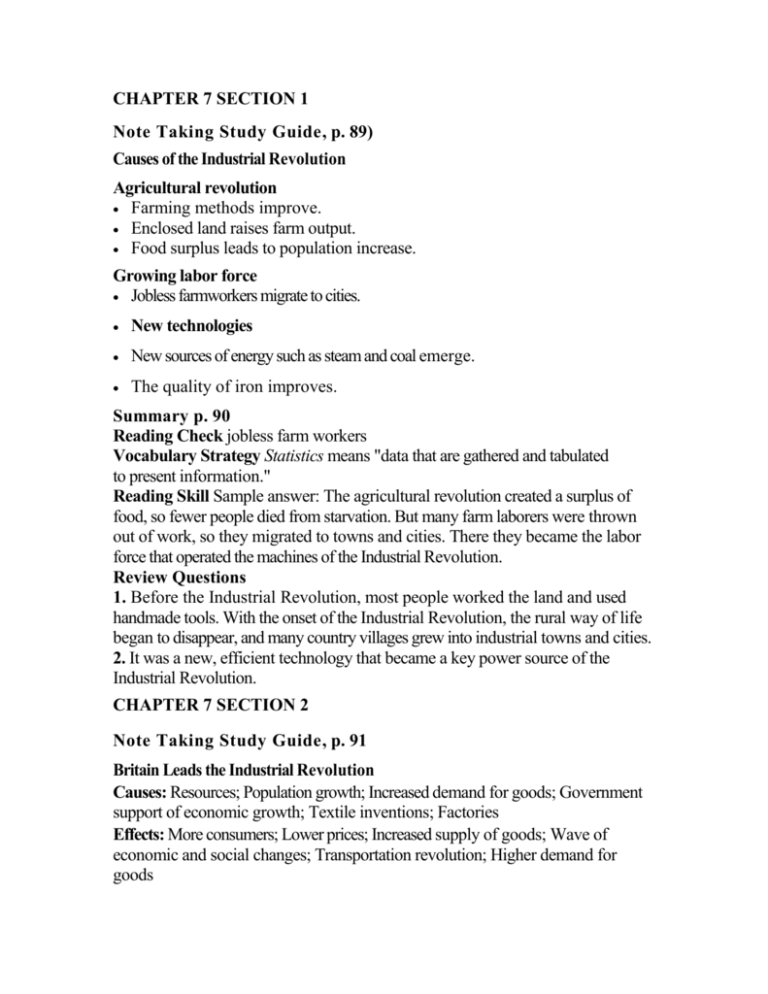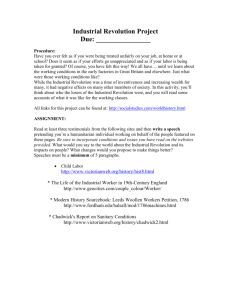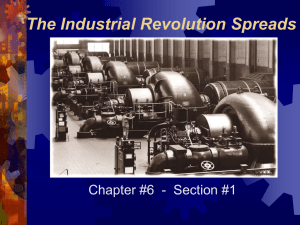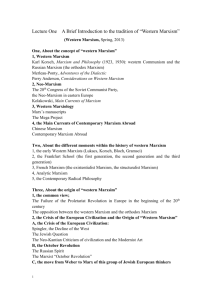CHAPTER 7 SECTION 1 Note Taking Study Guide, p. 89) Causes of
advertisement

CHAPTER 7 SECTION 1 Note Taking Study Guide, p. 89) Causes of the Industrial Revolution Agricultural revolution Farming methods improve. Enclosed land raises farm output. Food surplus leads to population increase. Growing labor force Jobless farmworkers migrate to cities. New technologies New sources of energy such as steam and coal emerge. The quality of iron improves. Summary p. 90 Reading Check jobless farm workers Vocabulary Strategy Statistics means "data that are gathered and tabulated to present information." Reading Skill Sample answer: The agricultural revolution created a surplus of food, so fewer people died from starvation. But many farm laborers were thrown out of work, so they migrated to towns and cities. There they became the labor force that operated the machines of the Industrial Revolution. Review Questions 1. Before the Industrial Revolution, most people worked the land and used handmade tools. With the onset of the Industrial Revolution, the rural way of life began to disappear, and many country villages grew into industrial towns and cities. 2. It was a new, efficient technology that became a key power source of the Industrial Revolution. CHAPTER 7 SECTION 2 Note Taking Study Guide, p. 91 Britain Leads the Industrial Revolution Causes: Resources; Population growth; Increased demand for goods; Government support of economic growth; Textile inventions; Factories Effects: More consumers; Lower prices; Increased supply of goods; Wave of economic and social changes; Transportation revolution; Higher demand for goods On-Level Summary (p. 92) Reading Check the cotton gin Vocabulary Strategy Decades means "ten-year periods." Reading Skill The causes of the great revolution in transportation include increased production and the need for faster and cheaper methods of moving goods. The effects include the building of turnpikes, faster transporting of goods, links to all parts of Britain, invention of the steam locomotive, growth of railroads, faster railroad travel, and boom in railroad building. Review Questions 1. Many factors contributed to the start of the Industrial Revolution in Britain, including population growth, plentiful natural resources, a ready workforce, and an increased demand for goods. 2. New inventions such as the flying shuttle, spinning jenny, and cotton gin increased the production of textile goods. CHAPTER 7 SECTION 3 Note Taking Study Guide, p. 93 Industrialization Benefits Created jobs Wealthy middle class Wages rose. Labor unions won right to bargain. Reformers improved working conditions. Challenges Crowded cities Pollution Struggle for survival in slums Harsh working conditions in factories and mines Child labor Summary, p. 94 Reading Check The entrepreneurs who set the Industrial Revolution in motion came from a variety of backgrounds to become the members of this new middle class. Vocabulary Strategy Contaminated means "unclean and impure; polluted." Reading Skill The working class struggled to survive in crowded tenements with no sewage or sanitation system. They were exposed to diseases, such as cholera, because of contaminated water. They worked long hours for low pay. Long work hours left them exhausted. Many suffered accidents from machines that did not have safety devices. Children as young as five also worked long hours. Review Questions 1. Changes in farming, soaring population growth, and demand for workers caused rapid urbanization. 2. The factory system imposed a harsh new way of life on workers. In rural villages, people's work varied according to season. In the factory, people worked 12- to 16-hour shifts, six or seven days a week. CHAPTER 7 SECTION 4 Note Taking Study Guide, p. 95-96 New Ideas About Society and Economics I. Laissez-faire economics A. Adam Smith and free enterprise 1. Free market would produce more goods at lower prices. 2. Capitalists would reinvest in growing economy. II. Malthus on population A. Malthus holds bleak view. 1. Population will outpace food supply. 2. Only checks on population are war, disease, and famine. 3. Families should have fewer children to preserve the food supply. B. Ricardo shares view. 1. Wage increases are futile for working poor. 2. Opposed government help for the poor III. Utilitarians for limited government A. Goal of society should be "the greatest happiness for the greatest number." 1. Laws or actions should be judged by their "utility." 2. Individual freedom guarantees happiness. IV. Socialist thought emerges A. Focus should be on the good of society in general, not on individual rights. 1. Belief that socialism would end poverty and injustices of industrial capitalism 2. People as a whole, not private individuals, should own and operate the means of production. B. Socialists establish utopian communities. 1. Hoped that equality among people would end conflict 2. Utopian industrialist Robert Owen sets up a model community in Scotland. V. Karl Marx calls for worker control. A. New theory of "scientific socialism" based on scientific study of history. 1. Inevitable struggle between social classes will lead to a classless society. 2. A classless society would end struggles for wealth and power. VI. Marxism in the future A. Marxism briefly flourishes. 1. In 1860, German socialists adapt Marx's beliefs to form social democracy. 2. Marxism leads to Russian Revolution in 1917. 3. Independence leaders elsewhere turn to Marxism. B. Marxism loses appeal. 1. Failures in Marxist governments illustrate its flaws. 2. Nationalism wins out over working-class loyalty. Summary p. 97 Reading Check early socialists who formed communities where work and property were shared Vocabulary Strategy Formulated means "devised or developed, as in a theory or plan." Reading Skill A struggle between social classes would lead to the creation of a classless society that Marx called communist. The struggles of the working class would end, because in a classless, communist society, wealth and power would be equally shared. Review Questions 1. They believed that a free market would help everyone, not just the rich. 2. They wanted some government intervention, especially to improve the hard lives of the working class. Utilitarians believed that the goal of society should be the "greatest happiness for the greatest number" of its citizens.









